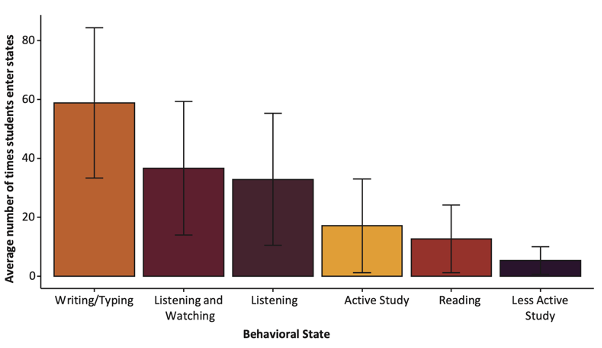Echo360 Academic Champion Uncovers the Importance of Video to Student Vets at The University of Edinburgh

Dr. Jill McKay had a natural affinity with animals from a young age. She has always been surrounded by a variety of different creatures, which influenced her career choices and brought her to her current role as senior lecturer of veterinary science education at The University of Edinburgh.

Having contributed to many research papers on animal behaviour and the impact of animal-human interactions, Jill published her first book in 2018, which offers great insight into how the individual personalities of animals can affect how we treat and care for pets, livestock and wildlife.
Jill’s interest in behaviour extends to humans too – particularly when it comes to understanding how education technology can support students in their studies.
She recently completed a piece of research into how veterinary students use lecture recordings which will provide insight for other institutions shaping their post-covid teaching model – and interestingly, it seems the use of video is not all about cramming for exams.
Digging Deeper into the Use of Video
Lecture-based teaching is changing as a result of the pandemic. While in-person lectures are not going to disappear any time soon, there is an increasing appetite in many universities to offer students more choice in how and where they learn.
As institutions move towards a more hybrid mix of live and online teaching, understanding how students learn independently using video is vitally important, as Jill’s research highlights.
“It has become standard practice in most universities to give students access to lecture recordings, but how do they use these resources? Are they being used in a meaningful way to support learning and achievement?” says Jill.
“These were questions I wanted to explore more deeply in my role as Echo360 Academic Champion at the University of Edinburgh,”
The Academic Champions are a group of academic and technology professionals from all over the world who are dedicated to boosting the development and use of Echo360’s video recording and active learning tools in their institutions. The scheme offers a grant that can be used to help universities make the best use of their hybrid teaching and learning platform to support students’ progress.
“We used the Academic Champions grant to launch a study of how veterinary students use lecture recordings,” says Jill. “This enabled us to conduct a survey of students, observe study sessions and examine student video usage data from Echo360. The initial findings make for interesting reading and could potentially challenge assumptions about the use of lecture recordings by students.”
A Key Study Aid
The results revealed that 78% of veterinary students were using video recordings to help them embed challenging subject matter, such as highly technical medical procedures or a detailed session on urinary anatomy. And 54% of students were inclined to use them as part of their strategy for learning new skills.
As Jill explains, “The study shows that many students value being able to use Echo360 recordings to revisit lectures they have attended or double check their understanding of what was being discussed in a live session, not just to catch up on a lecture they may have missed.”
Many students were using recordings to control their learning environment, pausing and rewinding difficult topics or jumping off at certain points to find additional information.
“It was great to see that the vast majority of students weren’t watching the entire recording through, but rather using the resources selectively as a study aid to help them build knowledge.”
Interestingly, less than half of students (48%) were using recordings in the run up to their exams. And undergraduates were more likely to watch a recording for longer than more experienced students.
“It indicates that lecture recordings are a key study tool for many students, particularly when they are new to the course and still finding out what learning approaches work most effectively for them,” says Jill.

A Fresh Approach
The findings of Jill’s study suggest that Echo360 lecture recordings are not only valued by students, they are also an essential addition in the toolbox universities provide to help students make good progress, whether they are learning in person or remotely.
As we look ahead to the new academic year, consider how you could help your students make better use of the video and other resources available to them and get them off to the best possible start.
You can read Jill McKay’s research paper in full here.
Contact us to find out how you could become an Echo360 Academic Champion and help ensure video and active learning methodology is driving student success in your institution.

